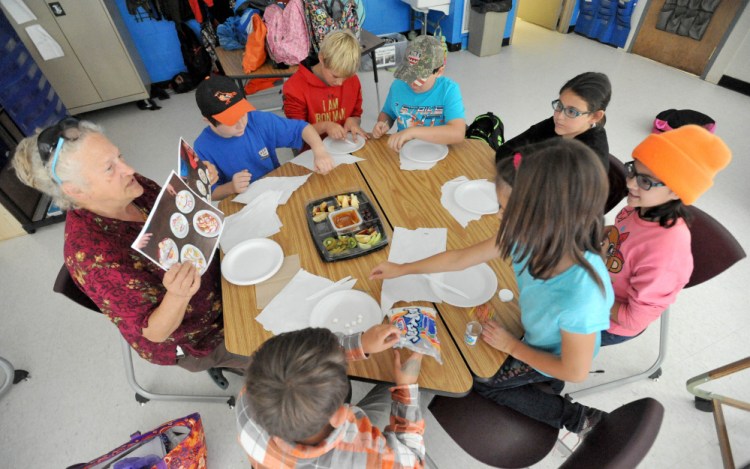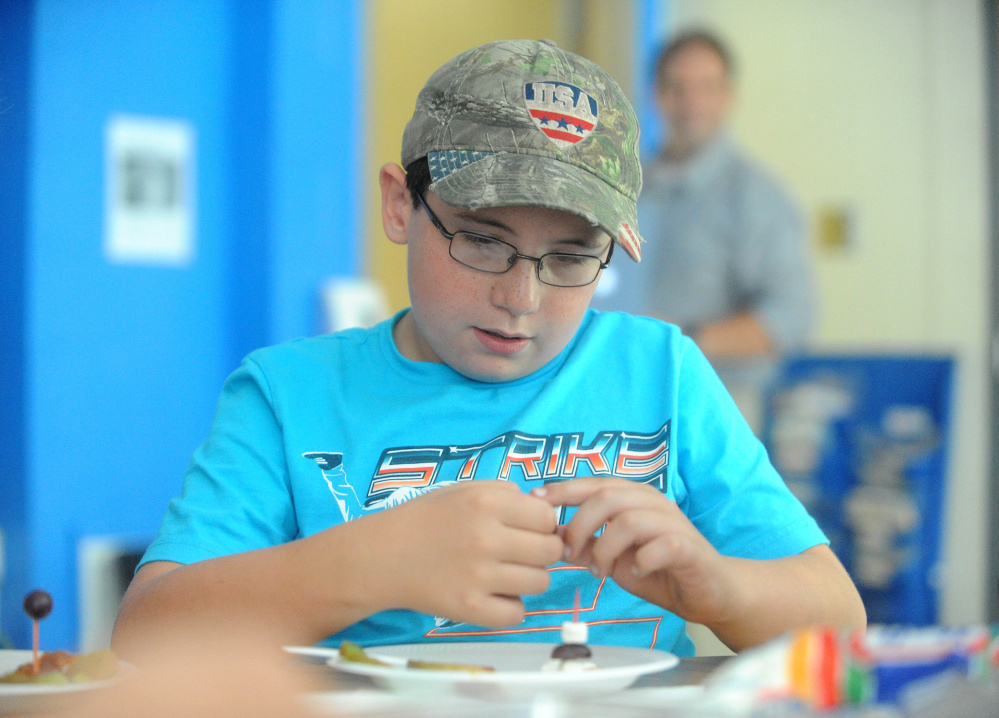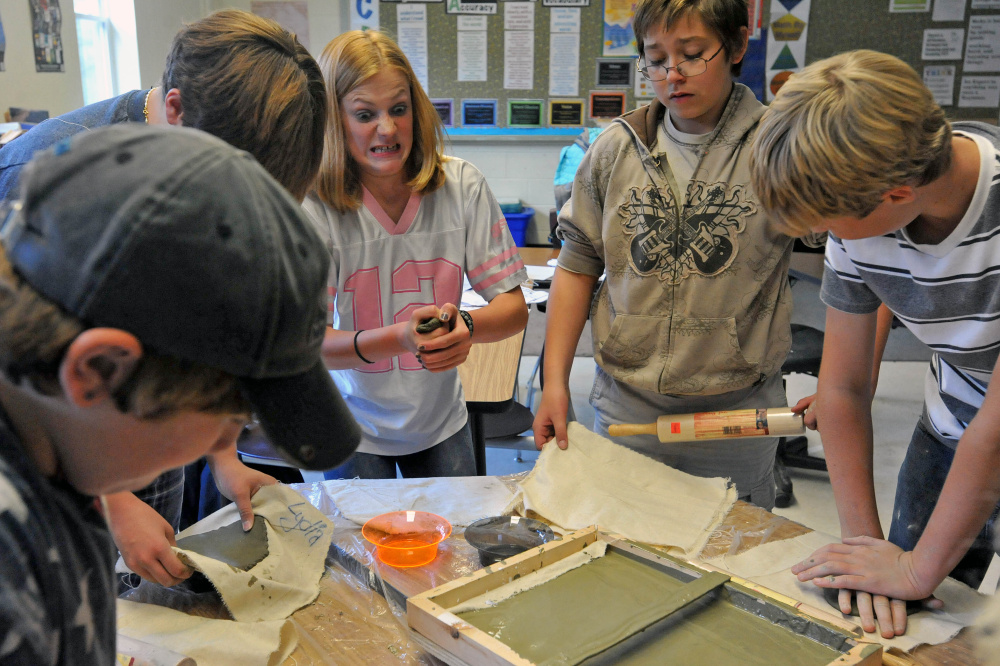CORNVILLE — What do you get using slices of red apple, green apple, some kiwi fruit, mini-marshmallows, a few grapes, pretzels, corn chips and you stick them together with caramel sauce?
Well, at the Cornville Regional Charter School, you get edible art.
The art class taught by Sally Baker, of Bingham, is one of four revolving courses of art and music at the charter school conducted as part of the regular curriculum each week. On a recent Wednesday afternoon as Baker and her students were making art with food, artist Shirleyanne Ratajczak, of Waterville, was teaching pottery, and musicians Elaine Loekle, of East Madison, and Gail Kelly, of Cornville, were giving music instruction, including singing songs with a roomful of kindergarten students.
School Principal Travis Works said the art and music groups, along with what he calls “student interest groups” for welding, jewelry-making, yoga, sign language, soccer, robotics, baby-sitters club, hiking and others offered by community volunteers twice a week, form an important part of the school day.
“It gives the students an opportunity to be exposed to a wide variety of things that they wouldn’t normally be exposed to,” Works said. “We find things the kids are interested in. The art and music piece is something we value greatly — they are part of the human experience.”
Works said a charter school is all about educating the whole child, and art and music are part of that goal along with the core content of math, language, science and agriculture.
The art and music projects run for nine weeks, then students switch so that they get instruction from both artists and both musicians. Loekle and Kelly work together some of the time, then break off into separate groups in which Kelly focuses on music theory and Loekle focuses on violin instruction and appreciation, Works said.
One provides the live music in the combined sessions, while the other teaches rhythm and dance.
Charter schools, like the Cornville school and the Maine Academy of Arts and Science on the campus of Good Will-Hinckley, are public schools that are allowed the freedom to be more innovative while being held accountable for advancing student achievement. Because they are public schools, they are open to all children, do not charge tuition and have no special entrance requirements.
The state is now billed directly for students who attend charter schools in Maine. Until this year, local school districts paid tuition for all students living within the district who attended the charter schools. The payment process created huge expenses for local districts. The Cornville school’s annual budget is $1.1 million.
In the arts and music classes this past week, students got their hands into gray clay that was mined locally on land owned by the parents of Justin Belanger, the school’s executive director.
“We’re making clay bowls,” said Aiden Belanger, Justin and Sandy Belanger’s son, during pottery lessons.
“I love it,” fellow student Logan Fowler, of Skowhegan, said of the class. “It’s fun. I’m learning how to mold clay and what kind of clay it is.”
Ratajczak, the pottery instructor, said students processed the natural clay to be worked last week by mixing it with water and then running it through cloth to take out unwanted particles.
The end results could make for some nice cereal bowls or a soup bowl for a possible soup supper at the school.
Over at the edible arts class, Baker and about eight of her students were busy trying to figure out just what to do with the cut-up fruit, pretzel pieces and caramel. It wasn’t easy projecting what a work of art might look like at first when the pieces were still ordinary food, the students said.
“Edible art is you make something and then you eat it,” student Clara Jewell said, assembling her apple slices into a triple decker with toothpicks. “I have no idea what mine is yet.”
Baker said that so far she and her students have done self portraits, which are on display in the hall, drawings and sketches for a mosaic project they will do later and some designs on graph paper. Baker also teaches yoga at the school and supervises weaving and jewelry making.
“This is the fourth week of the project, and we get to do edible art. They have to make it and then eat it after they explain what it is,” she said. “After everybody is done, we discuss what they’ve made and then everybody gets to eat it and clean up. It’s not your typical art class. We’re trying to make it somewhat healthy — edible art.”
The Cornville Regional Charter School, with 60 students in kindergarten through grade six, opened in October 2012 as the first elementary education charter school in Maine. The school now has an enrollment of 121 students in kindergarten through grade eight from towns all over the region.
Built as a consolidated school in 1956 and remodeled with a new wing in 1990, the Cornville school was closed by School Administrative District 54 in 2010 to cut costs. The town took over the school in June of that year, agreeing to raise $25,000 to heat and maintain the building. A group of residents led by parent Justin Belanger composed a 650-page application to open a charter school that would teach everyday skills, including cooking, knitting, gardening and woodworking, along with classroom lessons based on Maine Learning Results.
The instruction for reading, writing and math is connected to the Common Core Standards, Works said.
“In the future we will be able to pinpoint specific targets or learning goals for both art and music to make sure that students have mastery, which we currently do for the core subject areas,” he said.
Doug Harlow — 612-2367
Twitter:@Doug_Harlow
Send questions/comments to the editors.






Success. Please wait for the page to reload. If the page does not reload within 5 seconds, please refresh the page.
Enter your email and password to access comments.
Hi, to comment on stories you must . This profile is in addition to your subscription and website login.
Already have a commenting profile? .
Invalid username/password.
Please check your email to confirm and complete your registration.
Only subscribers are eligible to post comments. Please subscribe or login first for digital access. Here’s why.
Use the form below to reset your password. When you've submitted your account email, we will send an email with a reset code.